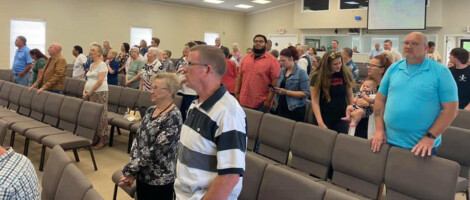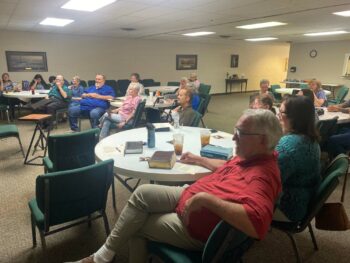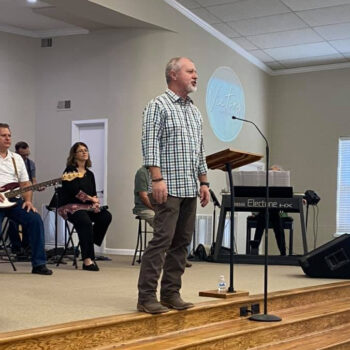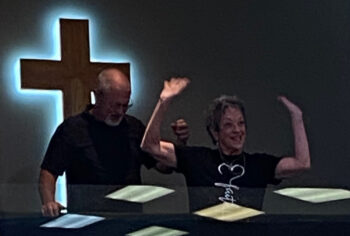Fort Worth pastor embraces discipleship, engages community with the gospel through Pave
by Jessica King on August 5, 2025 in Stories of Impact

Victory Baptist Church members worship during Sunday service.
After 18 months without a pastor, the once “independent fundamental” Victory Baptist Church in Haltom City called John Fletcher as their new pastor in September of 2019.
“When I came in, I told them I was a Texas Baptists guy… So we started making the transition to becoming a Texas Baptists church, which was a slow process getting it all shifted around,” said Fletcher. “We started giving to the Cooperative Program and really focusing in that direction.”
In 2023, Fletcher got involved in Pave, Texas Baptists’ church revitalization strategy, after hearing about it from Area 9 Representative Dan Curry and seeing posts on social media. He said Pave helped him define revitalization.
“I've pastored for almost eight years in two different churches, but I've spent over 25 years in the student ministry. [So], what came back to me was the realization that student ministers, children ministers and even sometimes music ministers, have been going through revitalization processes pretty much all of our ministry, we just call it preparing for the next group coming up because we're having to look ahead to reshape things to be able to reengage with different groups as they come up,” said Fletcher.
He said defining church revitalization gave him “a little bit better direction.”
“Tak[ing] that reasoning and that thinking process and applying it to the overall church, Pave just pulled it together,” said Fletcher. “It's like ‘Okay, this is what we've been doing, now we have a real term for it.”
Embracing discipleship
The first Pave principle Fletcher applied in his church’s revitalization journey was to connect with the congregation and give them a new vision.
“The first thing was… helping to get the vision to the people of ‘What are we doing? Why are we here, and who are we trying to focus on?’ Pave really helped to streamline a lot of that,” said Fletcher. “Coming from the student ministry perspective to where you can kind of do what you want when you want because you've got a different group of people, but ‘How do you do that with the entire church?’ It really gave me some good boundaries to work within.”
Fletcher said the most significant way the church’s vision has refocused and shifted has been by “the embracing of discipleship.”

Church members gather on Sunday evening for small group discipleship. In the fall, the group will focus on practicing evangelism in their spheres of influence.
Fletcher said before he arrived, the church didn’t offer small group discipleship, but relied solely on Sunday mornings and Wednesday evenings for spiritual growth. He said, “COVID helped us shift away from a traditional Sunday night service,” and he and his wife began offering small groups during that time.
“We're finding adults now are wanting to dig. They're finding out that discipleship is more than just showing up to a service and doing a check box, it's taking your Bible and digging into it and finding out ‘How does this apply to me?’” said Fletcher.
Fletcher said in this last session of discipleship groups, participants heard from “several folks from Texas Baptists” and learned about “different religions and belief systems” and how to minister to them.
“One of the things that we worked with very specifically was ‘What other belief systems are out there?’ … We brought in several folks from Texas Baptists on Sunday night to talk through the process [of] ‘Here's who this is, here's what they believe, here's how you would counteract it with Scripture,’” explained Fletcher.
Then, Fletcher brought in Jonathan Smith, director of Church Health and Growth at Texas Baptists, to teach participants about an evangelism model called “the evangelism circle.”
“[The evangelism circle is where] folks are identifying ‘Who are our five people that we need to work with, who are the folks that we need to to have a gospel conversation [with],’ or to start with build a relationship with that relationship and produce the gospel at various points, and then have a full gospel presentation with them and to keep that going,” explained Fletcher.
He said when discipleship groups begin again in the fall, they will practice applying the evangelism circle and sharing the gospel with the community around them.
“We've talked about it as individuals, but we'll get them back together as a group in September and say, ‘So where are we at now? How are we doing this? How are we presenting the gospel in [the] everyday as we work through it?’” said Fletcher.
Fletcher said there has been one church member who has embraced discipleship in significant ways.
“[This church member] started really digging into the discipleship now to the point where, my biggest adult Sunday school class, when that teacher's going to be out, [the class] asks this person to teach,” said Fletcher.
He said he has seen this member become more confident in sharing the gospel outside of church walls.
“I'm hearing that this person is actually talking about [God] at work… with other people that aren't specifically identified as believers. So I've seen that process happen where it's like, ‘So what can we do next? Where can we do this? Let's take what you're learning and make sure you're sharing that with your neighbors with your coworkers,’” said Fletcher. “Everything has not been given for me to hang on to, but for me to take and share with someone else.”
Engaging the community with the gospel
Fletcher said the church has also begun putting this into practice by serving the surrounding Hispanic community.

John Fletcher, pastor at Victory Baptist Church, delivers the sermon during Sunday service.
“Almost 80% of the community within a one-mile radius [of Victory] is of Hispanic origin, and so we have huge language barriers. We're one of the only Anglo churches in the area right now… [but] We've connected with a group called Cornerstone Assistance Network that they provide things to us, and we can then, in turn, provide it to the school. So we're able to reach the community right around us,” said Fletcher.
He said last summer, the church “brought in a group to do almost like backyard Bible clubs in strategic locations around the community, called L.I.T [Leaders In Training],” a backyard Bible club for fourth, fifth and sixth graders.
Fletcher said building a relationship with the community has been “a slow process.”
“One of the things that they keep saying in Pave is a phrase: ‘Don't microwave the brisket.’ So that's the thing that we're trying to do. We can't rush this,” said Fletcher. “So [we had] to rebuild that trust with the community, then we [had] to start reaching out to the community.”
Fletcher told Smith that his “biggest prayer right now is that God would help me find a Hispanic church planter” to further engage the community with the gospel, and because the Hispanic population in the area is growing, a Spanish church in their facility “could become much larger than what Victory is.”
“[I told Smith], ‘I've got a big facility that we're not using, I think I've got space. I would love to have somebody to come in and say, ‘Let's help reach the Hispanic community right here’ that wants to do Spanish [worship services],” said Fletcher. “He looked at me and he said, ‘You know that's working yourself out of a job,’ and I said, ‘That's okay… It's not about me.’”
Celebrating baptisms and getting out of your comfort zone
Since Pave, Fletcher has also implemented highlighting baptisms in Victory’s revitalization journey. He said between 2010 and 2018, there were only five recorded baptisms, but “in the past five years we've had 12 baptisms and been able to celebrate those.”
Fletcher said talking about baptisms and celebrating them regularly has helped more people get connected to the church, including online attendees.

In the past five years, Victory has seen 12 baptisms. Fletcher said talking about baptisms and celebrating them regularly has helped more people get connected to the church, including online attendees.
“We live stream [Sunday worship] and so we were able to have people see [baptisms] in real time, which in turn has also brought some folks that were watching online back into the building,” said Fletcher.
As Victory continues to revitalize, Fletcher asks for prayer that “the church would get out of its comfort zone” and that church members would boldly share the gospel with their spheres of influence.
“Sometimes we feel like we're doing [a good job], then if we sit down and really evaluate it, [we see], ‘I can go further.’ That's where we're at, to be able to say ‘let's get out past [our] comfort zone,’” said Fletcher.
Fletcher said he is thankful for Pave because it “really set the stage” for what he would learn as he works to earn his doctorate in church revitalization.
“Through my doctoral process, one of the things that I have determined is sometimes pastors, specifically older pastors and even bivocational pastors, tend not to collaborate with each other,” said Fletcher. “Pave has helped to kickstart that with some other folks, to say ‘Can I share what's going on with my life or my congregation with another pastor that could say, ‘I've had a similar situation, I tried this and it didn't work, but glean from it what you can’… We don't need to be doing this by ourselves.”
Smith said Fletcher has been an “incredibly thoughtful leader and shepherd” throughout the church’s revitalization.
“[Fletcher] is successfully navigating the arduous pathway of leading systemic change in a church by practicing patience, listening well, and most importantly, pointing his congregation to Jesus and the scriptures,” said Smith. “Leading revitalization is about shepherding, and Dr. Fletcher is shepherding well.”
Visit txb.org/pave to learn more about Pave and how it can be a resource to your congregation.
Strengthening a multiplying movement of churches to live out the Great Commandment and Great Commission in Texas and beyond.
The ministry of Texas Baptists is made possible by giving through the Texas Baptists Cooperative Program, Mary Hill Davis Offering® for Texas Missions, Texas Baptists Worldwide and Texas Baptist Missions Foundation. Thank you for your faithful and generous support.
Subscribe to receive stories like this one directly to your inbox.
We are more together.
Read more articles in: Stories of Impact, Pave, Church Health
More from Jessica King
- Millennial/Gen Z Network is "revolutionary," provides resources, community, refreshment for young ministry leaders
- Children’s Worship University trains leaders to “raise disciples in the area of worship”
- Corpus Christi church plant hosts annual retreat, meets medical needs for Ghanaian children with disabilities
- 98 BSM and church collegiate leaders form 2026 State Lead Team, develop skills to “change the culture” of ministry
- Behind The Chutes Cowboy Church shares resources, plants seeds of the gospel at Amarillo Fair & Rodeo